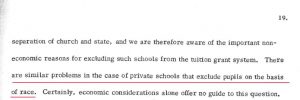Last summer during the peak of the Democracy in Chains scandal, Georg Vanberg brought two letters to light in which James M. Buchanan shared his private thoughts on the relationship between segregation and school vouchers. Writing to his friend Arthur Seldon, Buchanan expressed his concern about “the evils of race-class-cultural segregation that an unregulated voucher scheme might introduce.”
The contents of the Seldon letters directly contradict a central claim of Nancy MacLean’s book, which accuses Buchanan of indifference toward the effect of vouchers upon African-American students in 1950s Virginia. Clearly, in the Seldon letters, Buchanan recognized the need for safeguards to prevent abuses of vouchers for segregationist aims. Despite their relevance, these documents were brushed aside by a number of MacLean’s defenders in the history profession on account of their date. Buchanan wrote to Seldon in 1984, some twenty-five years after the Virginia school desegregation crisis.
Although nothing in Buchanan’s writings from the 1950s supports MacLean’s depiction of him as a complicit partner of the segregationists, her supporters saw little value in the Seldon letters. After all, couldn’t Buchanan have simply changed his mind in the intervening decades?
It turns out we can determine the answer to this question. MacLean’s argument rests heavily upon a 1959 article by Buchanan and his UVA colleague Warren Nutter entitled “The Economics of Universal Education.” Although Nutter and Buchanan steered clear of the segregation issue in their analysis and instead only laid out an economic argument for vouchers, MacLean depicts this article as an opportunistic offering of support to the segregationist “Massive Resisters” of the period (and largely because she misinterpreted a typo in another scholar’s work ).
As I’ve noted previously, Nutter and Buchanan actually reissued their 1959 paper in 1964 as part of a report they commissioned to assess the performance of the Virginia tuition grant program (an early voucher system arising from the 1959 debates) after 5 years in operation. As the economists’ introductory note in this second document indicated, their 1959 paper contained “minor updatings” to reflect the new report’s purposes.
David M. Levy, who is currently working on his own study of Buchanan along with Sandra Peart, caught one of these subtle updates in the final page of the report. The 1964 version contains a new line, appended to a section in which Nutter and Buchanan discuss “non-economic reasons” for when it may be legitimate to bar a private school from participating in the voucher program. The addendum specifically recognized “the case of private schools that exclude pupils on the basis of race.”
To add some context, this addition almost certainly reflected the events of the intervening years. Specifically, after the tuition grant program came into effect in 1959 the Virginia Education Association began aggressively lobbying to restrict its use to only segregationist purposes. The VEA’s campaign conflicted with the race-neutrality of the voucher law, but it gained a substantial following among public education interest groups. As further evidence of their anti-segregation views, the economists specifically attacked and rebutted the VEA’s position in another section of their 1964 report.
The addendum to Nutter and Buchanan’s “Universal Education” paper is telling though as it establishes that Buchanan held the same views he later expressed in the Seldon letters at least as early as 1964. Given that he likely inserted this passage in response to the VEA’s pro-segregation antics, it is reasonable to conclude that it reflected his genuine concerns.
